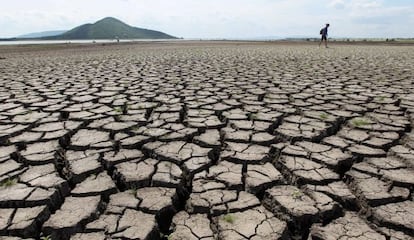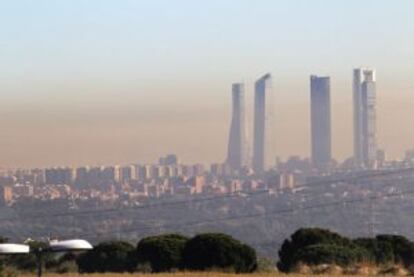Lima climate summit ends with last-minute pledge by 196 nations
But critics say non-binding text does not do enough to fight greenhouse gas emissions

After a two-week paralysis, the World Climate Summit in Lima finally produced results in the space of an hour on Sunday.
Delegates from the 196 countries represented in the Peruvian capital agreed to produce a joint document after marathon negotiations spanning 14 days – and some nights as well – had yielded no results.
The final text states that throughout 2015 all participating countries would present the United Nations with “quantifiable” commitments to cut their greenhouse gas emissions.
The pledge marks a notable change, since until now the fight against global warming had always fallen to developed countries, which are responsible for 80 percent of global emissions.
But the notion that everyone needs to do their bit has now started to take hold.
The 11th-hour agreement has saved a summit that had started with overly ambitious expectations yet could not afford to fail. The Lima gathering was the last stop before the summit of summits, Paris 2015, where a new agreement on climate change encompassing all countries has to be approved. The goal is to replace the inefficient Kyoto Protocol, in force since 2005, which only forces developed countries to reduce their emissions.
Failure to do so would question the entire validity of the United Nations Framework Convention on Climate Change, created in 1992 and ratified by over 190 countries. Mistakes are not an option in 2015. The message from the scientific community is clear: if we don’t get to work immediately on reducing greenhouse gas emissions, global warming will have devastating effects throughout the planet.
Considering these broader goals, the achievements at Lima are relative. The idea going into the summit was to develop a first draft of the future agreement, but even this has been only partly achieved. Mediators will have to keep working in order to go to Paris with a relatively well-defined text.
Bringing together representatives from nearly 200 countries for 14 days is an achievement in itself, but expecting them all to agree was practically impossible. Although everyone knows it is imperative to stop the planet’s temperature from rising more than two degrees – the limit set by scientists – it is by no means easy to get the biggest polluters and the biggest sufferers of pollution to agree on how to do so.

Money became one of the biggest sticking points in the debate between rich and poor countries. Developing countries refused to approve any text that did not force the largest economies to contribute to a fund to help them deal with climate change. But the latter, including the European Union, pressured to keep such commitments voluntary.
In the end, the text includes a paragraph that “urges” an increase in aid. This middle-of-the-road solution makes no one happy, but it did manage to break down resistance to a final text.
Although the final document is not binding and its contents are deemed weak by nearly everyone involved, political leaders applauded it. The climate change envoy for the Obama administration, Todd Stern, said the consensus allowed participants to “keep working on the France agreement,” while the EU’s energy and climate commissioner, Spaniard Miguel Arias Cañete, described it as “a good roadmap.”
Environmental groups, however, had little to celebrate. “The climate negotiations have failed to produce results,” said Samantha Smith, head of WWF’s Climate and Energy Global Initiative.
Optimists are now clinging to the oft-repeated line from ‘Casablanca:’ “We’ll always have Paris”
“The decisions made in Lima do not exclude the possibility of an agreement in Paris, but they do little to improve the chances of success,” said a spokesperson for Oxfam.
The road to Paris will likely be anything but easy. The China-US agreement to reduce emissions, announced in November, did not provide the inspiration observers thought it might. Not even the presence of US State Secretary John Kerry, who visited Lima to show his firm commitment to the cause, was enough to push a firm agreement through.
And so the curtains close on Lima and a new countdown begins. The optimists are now clinging to the oft-repeated line from the movie Casablanca: “We’ll always have Paris.”
Tu suscripción se está usando en otro dispositivo
¿Quieres añadir otro usuario a tu suscripción?
Si continúas leyendo en este dispositivo, no se podrá leer en el otro.
FlechaTu suscripción se está usando en otro dispositivo y solo puedes acceder a EL PAÍS desde un dispositivo a la vez.
Si quieres compartir tu cuenta, cambia tu suscripción a la modalidad Premium, así podrás añadir otro usuario. Cada uno accederá con su propia cuenta de email, lo que os permitirá personalizar vuestra experiencia en EL PAÍS.
¿Tienes una suscripción de empresa? Accede aquí para contratar más cuentas.
En el caso de no saber quién está usando tu cuenta, te recomendamos cambiar tu contraseña aquí.
Si decides continuar compartiendo tu cuenta, este mensaje se mostrará en tu dispositivo y en el de la otra persona que está usando tu cuenta de forma indefinida, afectando a tu experiencia de lectura. Puedes consultar aquí los términos y condiciones de la suscripción digital.









































